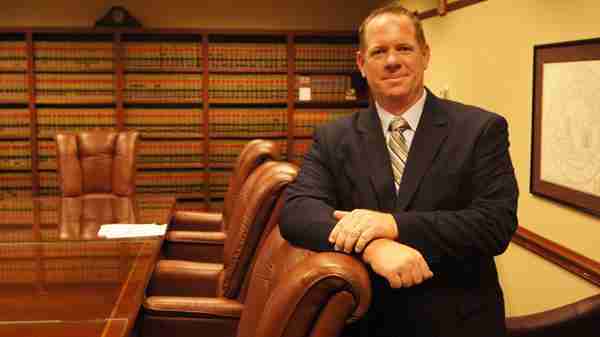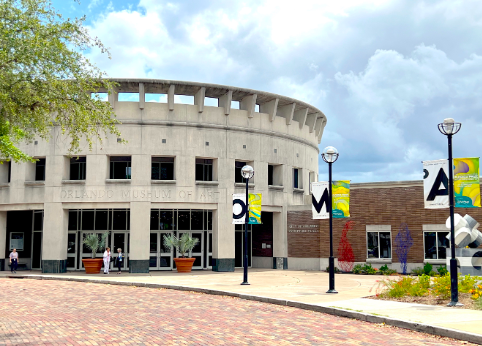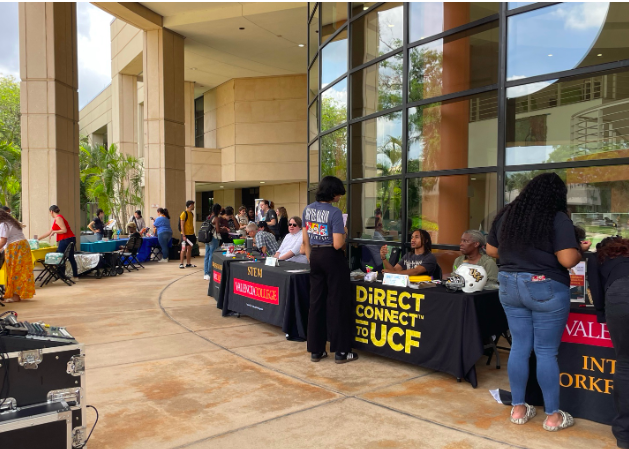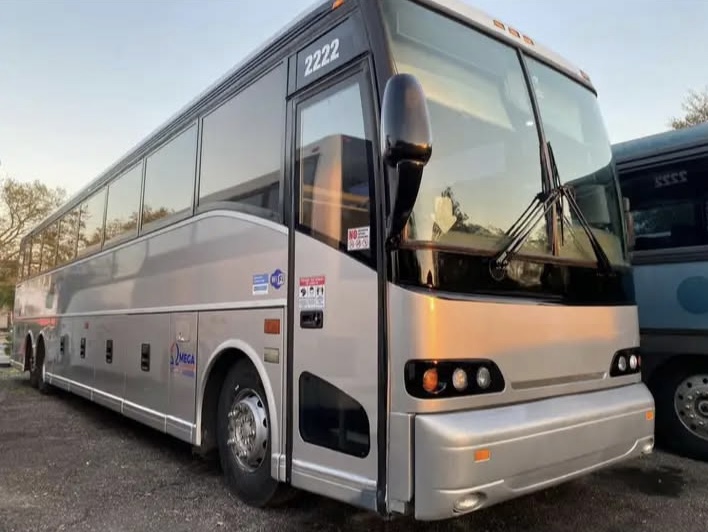Sean Ashby is a lot of things — native Floridian, talented golfer, husband, father and high school teacher. But now he’s trying out a different path, one that may take him to Tallahassee as a member of the Florida House of Representatives.
After graduating from Lake Howell High School in 1993 and pursuing a degree in Business at Florida State University under a golf scholarship, Ashby entered the public sector. Teaching in Seminole County for five years and then at Timber Creek High School in east Orlando for another five, Ashby instructs classes involving American government, law studies and economics.
He is now running on the Democratic ticket for the Florida House in District 50, encompassing parts of east Orange County and Brevard County, against Republican rival Tom Goodson. Ashby said that his decision to run derives from his experience in education and his desire to improve those conditions in his home state. We sat down with Ashby to discuss his stance on the issues facing Florida and the nation leading up to the November elections.
What do you think the hot-button issue is in the national 2012 elections, and why?
On a local level and on a national level, it’s jobs and the economy. Brevard County has one of the highest unemployment rates in the state of Florida. So, we need to make it more enticing for small business owners to open up businesses. We’ve got to make it easier, and financially a good idea, for current business owners to expand hiring. These are the different areas that are the main focus on a local level and on a federal level as well.
What do you see as the pressing issues in Florida that need to be addressed?
Jobs and the economy and public education. Those are the two big ones. Obviously, with the Supreme Court upholding the federal mandate on healthcare, that’s going to be a hot-button issue that’s going to be coming up as we implement it, but also as we see resistance from the government. Governor Scott has said he doesn’t want to implement any of these programs in the state of Florida. Well, number one, it is a federal law. Why would a governor take a stance like that on a program that is there to ensure that most people get affordable health insurance? Because I only see that as an opportunity to help out almost everybody. We need to lower the cost of healthcare in this country and this state. The number one cause of personal bankruptcy in this country is healthcare. There is the one side of it — and I agree — saying, ‘Why should we pay for people that don’t want to get health insurance?’ Well, we’re already paying for the uninsured in this country. Somebody who is uninsured and gets the common cold and goes to the hospital and can’t pay the $2,000 or $3,000 bill, who pays for that? It comes out of taxes and the insurance programs of everyone else who goes to the hospital. It’s added into our hospital bill. We need to give more people cheaper preventative care. Let’s give people who are uninsured the health insurance, instead of them going to the emergency room where it costs everyone else a couple thousand dollars. Lets get them to a doctor. Lets free up space in the emergency rooms, let’s lower the costs, because ultimately, in those emergency room-type situations, we all pay that bill. Those — jobs and the economy, public education and healthcare — are the big three issues.
How about District 50 in particular?
District 50 is an interesting district. It’s a wonderful district to have the opportunity to represent, because it’s east Orange County and north Brevard, and they’re two separate entities; two separate areas; two different sorts of opportunities. As I’ve talked about, Brevard has high unemployment and needs jobs. That’s the main concern there. In east Orange County unemployment is lower. But what we’re seeing in Orange County in the next few years is that the Lake Nona area — Medical City — is hugely expanding, and that is inside of my district. We’re trying to attract high-tech companies to move in. UCF is doing a wonderful job with the incubator program that they have, and bringing these high-tech companies into the area. Well, that poses two different opportunities that we need to fight over at home. Number one is that companies that have already moved here that have positions to fill are finding that they aren’t able to fill a lot of them because they don’t have the trained workforce available. So they’re not able to find employees who are able to work there. Valencia’s done a great job with the campus down in the Lake Nona and Osceola County area. They’ve started creating specialized programs to train employees, and that’s going to be a continued opportunity there. But then the next thing is, this is going to be the large area of growth over the next five to 15 years in Orange County and Central Florida. There’s going to be a lot of development because we’re going to bring in all these companies, so we’ve got to have places for people to live. So, the Lake Nona Corporation, Tavistock and these different groups in the area, they’ve really been taking a look at the long-scale plans of where this growth and development is going to be. My concern is, number one, if we’re going to do this, let’s do it right. Let’s not just bulldoze over land, trees and environmentally sensitive areas and throw up houses and neighborhoods all over the place. That doesn’t do us any good, and I’ll explain why in a second. Number two is we need to control the growth because we do have environmentally sensitive areas. We are going to have water shortages in this area. So we need to ensure that we’re not overtaking our opportunities for clean water while protecting the environment, but then back to constructing the homes, we also need to protect home values. Because if we go in and throw 5,000 homes into an area, what’s that going to do to the home values of everybody else? It’s going to hurt them, so let’s do it in a controlled fashion. Control the home prices, to ensure that those remain stable and increase in the future, as well as protecting our resources — water, environmentally sensitive areas — because those are things that will affect not only the people in that area, but because of the Econ and St. John’s River, that will then affect those individuals further downstream who rely on clean water that runs from these tributaries.
How are you a better choice for District 50 than your Republican rival, Tom Goodson?
Well, number one, Tom doesn’t even live in the district. He lives out of the district. One way that I look at this is that I live in this community. Before the final lines were drawn for this district, I made the decision to run in this race, no matter who my opponent was going to be, because I wanted to represent east Orange County, Avalon Park, Lake Nona — I wanted to represent this area in Tallahassee. We have not had a local representative from this area in years, if ever. My opponent, however, who does not live in this community, he is not our neighbor. He is not our community partner. He is a gentleman who is worth several millions of dollars, who is campaigning out of district for a $30,000 a year part-time job. I think that brings up the question of, why? It’s not for the money. So what are his motives for doing this? He’s not representing his community. I want to represent my community. I think that’s a big part of this. If we look back at his votes in Tallahassee this last time he was up there, he voted time and time again against funding for public education. He voted against private partnerships with public education. He voted for $300 million cuts to higher education in the state of Florida. These are devastating things that my opponent has done when he was in office this short term.
Why is it that the public jobs are slashed when budget cuts have to be made, given the dire situation with unemployment?
The Florida Chamber of Commerce largely drives the Republican agenda in the state of Florida. The Florida Chamber over the last several years has decided that they want to attack public workers in this state. Education, prison workers. They want to take everything that’s out there and privatize it as much as possible. It can’t work. Look at education. There’s a huge push in this state right now to go to charter schools. Number one, why are we creating a dual system of education in this state? Because what it’s doing is it’s taking money away from public education, where it needs to be, where we’ve done an excellent job, and diverting it to charter schools where they’re making a profit. There’s a lower set of criteria for charter schools and the students and their gains than there are for public schools. An example of this is in the last session, they allocated $55 million to new construction of schools in the state of Florida. Zero of those dollars was for public education. All $55 million was set aside for construction of charter schools, using taxpayer money, which then in turn would be turned over to for-profit charter management companies. It doesn’t make sense.
Another issue is the prison privatization. They’ve had this huge push over the last couple of sessions and even tried to sneak things in, and judges have had to step in and say, ‘Republicans, you’ve overstepped your boundaries, you can’t do this.’ They’re trying to privatize prisons, starting in the south Florida region. Well, number one, public safety is an issue here. In a private prison, if an inmate escapes and the workers there at the prison see him running outside of the prison, they can’t go and get him because it’s outside their jurisdiction. So now they have to call in the local authorities to get the guy now that he has a 20-30 minute head start. The other issue is that many of these corrections officers that have been working in the prisons for 15, 20, 30 years, once that prison gets privatized, they lose their jobs, including the years they’ve built up. So they may get re-hired, but they’d lose those accumulated years and would be starting from scratch. Arizona privatized some of their prisons a few years ago. A couple years after that they conducted a study as far as what the cost savings were to the taxpayer by privatizing the prisons, and they found out that privatized prisons actually cost the state more money than the state-run ones.
The other one they pushed is the 3 percent tax on all public workers. That one was pushed by the Florida Chamber. They said that Florida’s public workers should be paying into their retirement program because the program was going bankrupt. That was absolutely false. All the top economists in the U.S. took a look at the Florida retirement system and they said, ‘No, this is a very solid program. It’s got enough money coming in. It’s doing what it’s supposed to.’ But they went ahead and decided to take 3 percent out of every public server’s paycheck. There’s two sides to this. Number one, for all public workers, that’s 3 percent. So for myself as a teacher and for my wife as a guidance counselor, that’s 3 percent we automatically lost. The other side is if you take all the public workers in Florida and that 3 percent, by my last calculations using different data, that’s about $1.1 billion that now the state has not released and is holding onto. That’s a $1.1 billion economic hold that Floridians have not been able to spend in Florida’s small businesses. It killed our economy in the state of Florida by $1.1 billion because of this one bill.
What are your thoughts on the 2010 midterm elections that saw Gov. Rick Scott and Sen. Marco Rubio into office? Was it a conservative wave, or people getting anxious and impatient after two years of a sluggish economy under President Obama?
I believe that’s a portion of it. I think it was largely politics at play again. We did see a change in congress — in the House — moving more Republican. It’s just one of those things, trends and waves. And I think a large part of it is voter turnouts. Generally in the midterm elections you see lower voter turnouts than in presidential elections. And historically, Republicans turn out in greater numbers than Democrats do, especially in midterm elections. So I think that was a big portion of it. That is really a big push we are making for this presidential election — reminding Democrats and Independents to get out there and vote, because Republicans have always done a very good job of making sure fellow Republicans get out and vote. So we need to make sure the Democrats get out there, voice their concern in the voting booth, and vote for the best candidate with the best positions.
On your website you cited Republican attacks on the middle class. What do you credit the wealth-gap discrepancy in the past 15 years to?
A lot of that comes down from the federal level, but also there’s a lot of stuff within the state of Florida here. An example of that is the 3 percent tax on all public servant wages. The fact of the matter is, if we take a look at the public sector, most — I’m not going to say 100 percent — but most of the people that work for the public sector are middle class families. And there have been continued attacks. Teachers, police, firefighters, prison workers — these are middle class families. And I can understand that because of less tax dollars coming in, the public sector has not seen significant raises for several years, but now all of the sudden they have to take a 3 percent cut. This is an example of those types of attacks on the middle class. We’ve seen the middle class dwindling so much over the last five to 10 years. It’s the rich getting richer and the middle class continuing to shrink down toward the poverty level, and it’s an issue that we really need to look at, because the middle class is the driving force of this country.
What is your position on the Supreme Court decision Citizens United v. FEC, which espouses that corporations are people with the right to freedom of speech, and that speech can equal money and therefore corporations can donate unlimited amounts of funds to get candidates elected?
This is a ruling that, when it first came out, we knew it was going to be a problem. We’re starting to see that, and I think we haven’t seen the full extent of this ruling. To add onto that, there have been other Supreme Court rulings that have been in the same ballpark, which kind of muddies the water a little bit. For example, there have been continuing attacks on unions. Now, members of labor unions are generally middle class. The unions are the voices for these individuals — these thousands of workers. There was another ruling a little while ago which said that it’s okay for a state to have a law that unions, with certain conditions, had to ask members if it was okay to use some of their dues for political reasons. So you have to actually go to them and have them sign a paper. Well let’s look at a corporation. If I own a mutual fund or own stock in a company, and that company is giving thousands if not millions of dollars to a political candidate, based on prior rulings, shouldn’t that corporation ask me, part owner, if I’m okay with them donating to specific candidates? These are the types of lawsuits that haven’t popped up yet, but I can see them in the near future, because to me this is the type of system that’s going to break apart. If we have a society where corporations with millions of dollars can pump millions of dollars into any candidate’s campaign, and then you also have individuals where there’s limits on how much they can give, who has the bigger voice? The corporations do. So then we’re getting into a society and a country where all of these corporations are going to be determining who the politicians are. And then the politicians who are in office, who are they going to vote bills that are favorable for? Those that donate to them — corporations.
What are your feelings about Sen. Bernie Sanders’ (D – Vermont) petition to get this decision repealed? Is it a good idea and would you be willing to support it?
Absolutely. We need another case to work its way through the system to really challenge the Citizens United case. To my knowledge, the court has not taken up or ruled on anything similar to it yet. I think, realistically, it’s too soon right now, and here’s why. The court generally does not like overturning another Supreme Court ruling within just a few years of itself. If we look at Plessy v. Ferguson, Brown v. Board of Education, we’re talking 60 or 70 years of difference between those rulings. And the reasoning was the society — the country — changed, and we saw how the effects of a prior ruling affected the country at the time. That’s why the court in Brown v. Board of Education decided to overrule Plessy. Well, with Citizens United, it’s still too early yet, because I don’t think the court can really look at a ruling that they made two or three years ago, and say, ‘Well, this is how it impacted the country.’ It’s too soon. I think we need a little time to see how it affects the country, and then we need to have a case that works its way up. I’m not for bypassing the system, I’m for using it because it’s the best system out there. It’s not perfect, but it’s the system we have in place. Let’s use the system and get to the right ruling that the country needs.
Many Republicans have stated that their primary goal is to make Obama a “one-term president,” and have refused to compromise with Democratic leadership in Washington (the debt, taxes, etc.). What would you be willing to “come into the center” with Republicans on if they were willing to compromise now? (In other words, compromise is how things get done in a divided house, so what do you think everyone can agree on?)
Well what I will say on this is that the last Speaker of the House in the state of Florida gave closing remarks to the House on his last day. He looked every Republican in the eye when he was in that chamber, and he told them, ‘Do not compromise, do not give up the good fight, do not give in, do not compromise.’ So that is an entity we are up against. How can we move to a better place, a place where people can agree if you have a whole segment that refuses to compromise? So that is a difficulty that we need to ensure we can overcome. Beyond that, Republicans, and in particular the Florida Chamber of Commerce, over the last few years have pounded different programs for education, saying, ‘This needs to happen and that needs to happen,’ and educators and administrators have had to largely just fall in line. And most of these programs are not good. They’re not constructive for building a better society or better workforce. Here’s what we need to do: We need to get both sides to sit down at the table. I’d be more than happy to lead something like this. We should get Chamber and business leaders on one side, and educators and administrators on the other side. And the educators look at the business leaders and say, ‘What is it that you want young adults to be able to do when they graduate high school? What is your criteria? What about teaching trades?’ Then at that point we get that input from the business section, and then the educators — the ones trained to create curriculum and programs — say, ‘Okay, here’s what we can do. If this is what you want, this is what we can do for you, and we can work together to rebuild a public school system that accomplishes the goals on both sides.’ And that, to me, is the compromise on public schools that needs to take place. As far as the former speaker’s final words go, we can only try. Ultimately, voters have the choice in the voting booth. If two years from now they don’t like what they see, they have a voice. Voters always have a voice in the voting booth. That is the tool that the voters have to say, ‘Hey, if you’re not willing to compromise, we’re not willing to vote you back in.’







